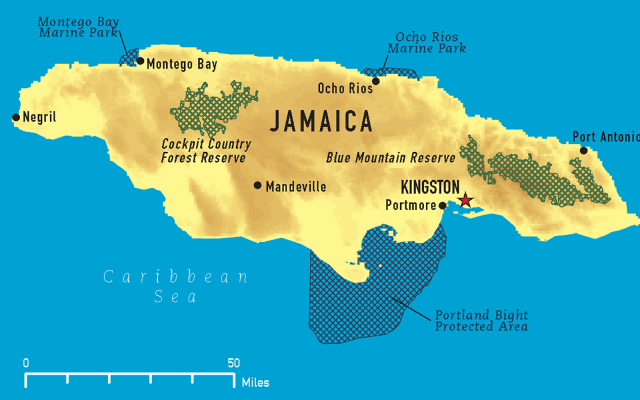Jamaica
Area 6,829 square mi (10,991 square km)
Population 2.721 million 2014
Capital Kingston
Highest Point 7,401 ft (2,256 m)
Lowest Point 0 m
GDP $14.36 billion 2013
Primary Natural Resources bauxite, gypsum, limestone, sugarcane.
JAMAICA, SOME 62 mi (100 km) south of CUBA, is the third-largest island in the CARIBBEAN SEA and is full of numerous terrain features and vegetation. Surrounding the island is a coastal plain with numerous bays and broad flatlands, especially along the southern coast. Along the north coast, lush vegetation and white sandy beaches attract many visitors. The interior of the country is full of vales and deep ridges. Bush-covered hummocks, sinkholes, and underground caves carve out the limestone-rich region. The Blue Mountains in the east provide a dramatic sight.

Numerous animals and plants are scattered throughout the lush land that supports a tropical moderate climate. The Jamaican hutia is the only native land mammal still alive and 20 species of bats inhabit the country. Crocodiles are found in the swamps, and lizards and frogs are present all across the island. Egrets are commonly seen flying through the air, and John Crows (turkey buzzards) are found in all areas. Woodpeckers, owls, and doves are also some other birds in the island. Throughout the surrounding waters, brain corals, soft-flowering corals, and over 700 species of fish are supported by the reefs in this part of the Caribbean Sea.
Christopher Columbus discovered Jamaica on May 4, 1494, and the Spanish controlled the island until the signing of the 1670 Treaty of Madrid, which handed direct power to the British. The British created a representative system of government, which gave the white settlers power to implement laws. This legislative system lasted until 1866.
Slavery in Jamaica lasted until 1834. By that year, the country consisted of more than 311,000 slaves and only around 16,700 whites. For almost 200 years, slaves were found throughout Jamaican sugar plantations. Estimates state that over 1 million slaves were transported from Africa to Jamaica during this period. Runaway slave communities were created on the island and they even fought successful small-scale battles against British soldiers.
With the decline of plantation life and rise of black revolts, the British government took direct control of the government. They implemented rules where landowners were required to produce titles of ownership. Many of the black peasants did not have the titles and were thus forced off their land. The plantation economy of Jamaica formed once again with the sugar and banana industries, and thousands of the blacks began to migrate to other countries.
In January 1958, Jamaica joined a collective West Indian state of nine British territories, the Federation of the West Indies. However, after a national referendum, Jamaica withdrew from the federation and began to negotiate with Britain for independence, which was ultimately granted in 1962. The Jamaica Labor Party (JLP) won the elections and Alexander Bustamente became the prime minister.
Throughout the 1960s, attempts were made to bring foreign manufacturing companies to the country. The companies were given tax breaks, but many implemented racist policies, which gave white workers higher positions. In 1972, the JLP was voted out of office, and the progressive party, PNP, returned, led by Michael Manley.
Manley began a program of democratic socialism. Foreign companies were nationalized and employment policies were revised with blacks gaining higher positions in companies. Education was also funded by the government. Middle- and upper-class residents fled the country, and Jamaica fell into an economic crisis. In 1980, political violence swept throughout the country, and the JLP, led by Edward Seaga regained power. The new government abolished many of the social programs and implemented new strategies to bring in foreign assistance.
The PNP and Manley returned to power in 1989. In 1992, Manley retired and Percival James Patterson became the first black to hold the post of prime minister. Patterson currently remains in this position and the Jamaica government continues to attempt to revive the poor economy and end the rising unemployment throughout the country.